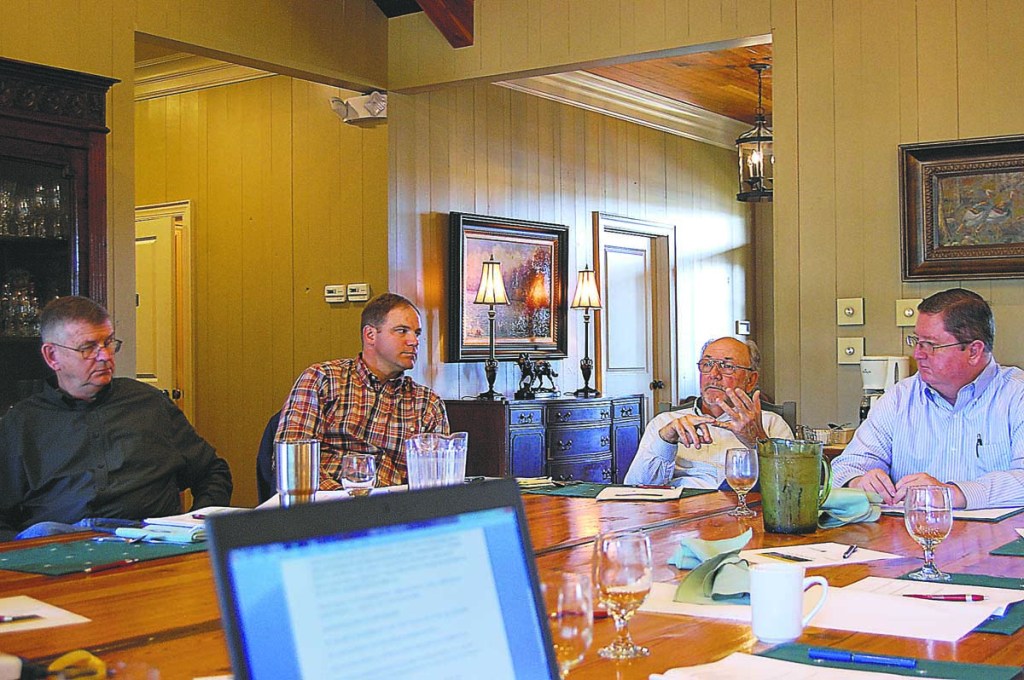Colquitt County Commission chews over tough issues
Published 8:41 pm Wednesday, January 18, 2017

- Members of the Colquitt County Board of Commissioners met Tuesday for a planning retreat at Sundown Farms. From left are Commissioner Paul Nagy, County Administrator Chas Cannon, Commissioner Johnny Hardin and Commissioner Marc DeMott.
MOULTRIE, Ga. — The ham and green beans with sweet tea went down easy, but some of the offerings on Colquitt County commissioners’ plate during a daylong Tuesday retreat were harder to swallow.
These included questions like: What to do about an aging jail? How to retain employees — particularly in life-and-death public safety jobs — when they can make significantly more money by driving over to the next county? Does the math add up for housing state prisoners at a net loss on paper when that cost is balanced against the value of inmate labor? And how to work effectively with each other and administrative staff to tackle these and other tough issues?
Coluitt County’s jail, occupied in early 1990 with two prisoner pods and later augmented by a third, is showing signs of age. Joining in the discussion was former-sheriff and now District 2 County Commissioner Al Whitington, who gave his perspective on the issue from a lengthy law enforcement career.
The current facility was built with space for 200 male and 10 female inmates.
Those numbers have been exceeded, with as many as 317 inmates at times, and up to 42 women in at least one instance, Whittington said. There has been an instance where 11 people jailed on murder charges were incarcerated in the facility.
“It’s just a sign of the times,” he said, referring to the need to house more people awaiting trial or for transfer to state prisons after conviction. “You’re going to have to build an additional pod eventually.”
One big reason the numbers have increased significantly, Whittington said, was the closing of state mental health centers in Milledgeville and Thomasville. Lack of beds for treatment in those places mean that more are needed in county lock-ups.
“One day Thomasville mental health was full,” he said. “The next day it was closed and those people (being) treated there, were those people healed overnight? No. Do you know where they are? They’re in our jails.”
Commissioners took no votes during the session at Sundown Farms Plantation that gave them time to toss out ideas during lengthy discussion that was guided by facilitator Gordon Maner, senior publice service associate at the Carl Vinson Institute of Government at the University of Georgia.
County Administrator Chas Cannon brought up the idea of starting from scratch with a new jail facility. He cited the high costs of the multiple-pod system such as multiple heating and cooling systems and staffing three separate units. He also suggested that the sale of highly valued land on Veterans Parkway where the jail sits could be a boon for the county’s coffers.
“It’s close to 30 years old,” Cannon said. “It’s going to take a lot of maintenance. The board will be throwing money away trying to fix that jail. It’s kind of a poor design for utilities. It’s very inefficient the way it’s set up, and it’s prime real estate.
“I’d say by 2025 we’ve got to do something about the jail. It’s going to be nearly 50 years old by then.”
Spending millions of dollars now could be a poor use of taxpayer money, Whittington said.
“I’d hate to put $2.5 million into that facility and know some time in the near future it’s going on the ground (demolished),” he said.
Estimates for a new facility range from $10 million to $15 million, depending on its size, county Finance Direcor Wayne Putnal told commissioners.
Whittington also mentioned the roof, which newly elected Sheriff Rod Howell said during a Wednesday telephone interview is reaching the end of its useful life.
“It’s just showing its age,” Howell said. “It’s already been open 30 years, 24 hours a day, never closing. For the most part, we’re out of space.”
Floor space in the three pods puts maximum occupancy at 266, he said, a number that rarely is exceeded. Howell, who was chief jailer for three years before his election as sheriff, said the number of inmates averaged about 215, a manageable number. Currently numbers are not so high that they pose safety issues due to overcrowding, but the eventual need for more space is acknowledged and on the staff’s radar.
Along those lines, Howell is working out a facilities plan for two, five, seven and 10 years to keep repairs manageable and minimize surprises from large, unanticipated expenses.
One option is building a new pod at about $2 million to replace one of the two original pods and later replace the other.
That would make more sense than refurbishing an older pod at a cost of $1.5 million. If commissioners do plan on replacing the jail any time soon, Howell said he would alter his plans to fit in with that scenario.
“My goal is to protect the taxpayers,” he said. “We want to make sure we utilize the money to get the most benefit out of it. Our goal also is inmate protection. We want to emphasize that we’re doing planning, we’re thinking for the future.”
On the issue of retaining deputies, Howell said that ultimately the bottom line is money. Currently the office is nearly at full-staff. Fortunately, officers also take seriously their jobs of serving their community.
“One good thing about the sheriff’s office is that it’s where people want to be because it’s their hometown,” Howell said. For those who do leave.. “I think it’s a money issue, trying to do better for their families. It’s a tough job. I won’t blame someone for going somewhere for $2 or $3 more an hour that they can earn in, say, Valdosta.”
Cannon proposed a pay-step system where employees would know that if they stay on the job then they will get some kind of pay raise every other year as they take a step up the latter in time. And if they do an exceptional job and are ambitious they also would earn more by promotion.
Cannon gave no specific suggestion on the amount of across-the-board increases. He said the issue will resurface when commissioners start planning for the budget year that begins July 1. The pay step plan is something that the county’s finances will allow without raising taxes, Cannon said.
“I know we can’t do it today, but I want to adopt this,” Commissioner Paul Nagy said of Cannon’s plan. “I would like that to be a goal to get this adopted when we do the budget, and I’d like to see it (set at) 2 percent.”
Commissioner Johnny Hardin agreed, saying he is willing to look at 3 percent.
As someone who for 16 years was on the other side of the table asking for more money for his employees, Whittington added, “We’ve got a long way to go to catch up.”





